12 Days of ADHD 7: Senses
Saturday 23rd October, 2021
October is ADHD Awareness Month. I've decided that I'm going to use that as a writing prompt, and to set myself a challenge. For the next twelve days, I'm going to write something about my experiences learning about ADHD as a very recently diagnosed adult.
It's nice that people have encouraged me to keep on writing, and a few have said that it's been genuinely insightful reading about how my mind ticks. Today, I thought I'd have a crack at describing, literally, how I perceive the world.
The sensory side of being neurodivergent
Sensory overload is something that's widely known about; we know how loudness, crowded places, strong smells, uncomfortable sensations and motion sickness can all lead to over-stimulation and cause people a lot of grief for people across a myriad of diagnoses, from Autism, ADHD, PTSD, Generalised Anxiety, Scizophrenia, Chronic Fatigue, and a whole host of other neurological conditions - as well as sap the general population of their energy, too.
However, I feel like it's not something that gets highlighted much when it comes to ADHD. Sure, we talk about getting overwhelmed, but nowhere in diagnostic criteria is there any mention of it. ADHD diagnoses are all to do with how you present to other people, with no mention of, say, sensory overload.
Due to that, and due to the fact that your own senses are internal to you and very individual, I feel like the sensory side often gets under-explained and overlooked. There are things that I've noticed about myself, which may be things which everyone experiences, may be characteristics of ADHD, or may be just me specifically, and that ambiguity makes it tricky to know whether these things are treatable or simply part of the human condition. The ones I'll mention though, I've asked various people about in the past - friends and family - and they've sounded perplexed, so maybe these are down to having a neurodivergent brain!
Visual Snow
This is something I've always taken for granted - when I was younger I thought everyone experienced this. You might think I'm talking about floaters, the squiggly things you see when you look at a blue sky, but no. I'm talking about having a persistent level of "TV static" or "film grain" that's always there, regardless of how much light is getting to your eyes. I believe that we all get it to some degree - when it's very dark, or even pitch black, your rods and cones aren't impervious to noise, so we all get Eigengrau.
What's different for me, is that I can be looking at bright white surfaces and still be looking at it through a strong field of colourful static, which flickers and strobes subtly. I also get auras around areas of high contrast, such as strong edges, and strong edges also create after-images as I look around - which can be quite annoying when reading black-on-white text, as I alluded to last post. If you close your eyes whilst in a well-lit room, look at something with strong edges and you might get what I mean - the after-image will persist for a few seconds and slowly fade (I assume). However, do you get the same effect if you keep your eyes open? I do - and I'm not sure if that's common. It's something that seems to get worse when I haven't slept well, my blood sugar's low, or I'm frazzled, stressed, anxious or overwhelmed. I think what I'm describing here is Palinopsia.
I also tend to get glare from all light sources. Everyone gets glare, but this might be strange - if you've ever looked at a UV light, you might get this - I can look at the light and focus on it directly, so it has a strong clear edge and the bright object is perfectly in focus, but at the same time the light from it is blurry and it feels like I need to focus on it more. It's not due to one eye being slightly out of focus with the other, because it persists even with only one eye open. It's like I have to shift my attention between the glare and the light-emitting object, rather than physically adjusting my focus.
Lastly - I tend to actively notice floaters all the time, not just when occasionally looking at a blue sky or a uniformly bright surface. Maybe that one's down to me being hyper-attentive to visual stuff.
Here's an example of the things I've described.
Click to switch the effect on and off.
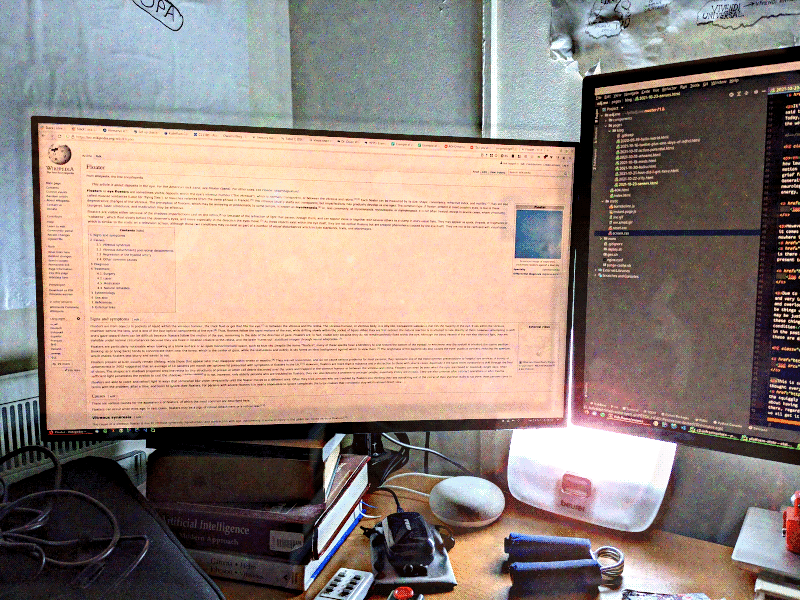
There is also a good simulation of visual snow on this website, as well as simulations of the other things I've described (so aside from the snow, maybe the rest are Regular People Things?).
These are things which I've always experienced, and for the most part they don't bother me; they're more of a curiosity than anything. Though sometimes they can be quite distracting - imagine going into a quiet study room in a university library. Zero distractions. No noise. Well lit. Just you and a paper you need to read. Literally all you have to do is sit there and read through this paper - already willing your mind to stay on task - and then you have to compete with this bullshit for your attention too!
What I've been describing has come under the umbrella of "Visual Snow" which is something that is undergoing some research, but doesn't appear to be understood much yet. Potentially there are some links between ADHD/Dyslexia and visual snow, although very few studies appear to have been done on this. It also appears to be connected to Hallucinogen persisting perception disorder (HPPD), though I can't remember taking heroic doses of shrooms when I was a baby, so I think it's safe to say there's correlation not causation there. Still, someone has provided an example of HPPD vision which feels similar to how I see things...

I think a major problem with this stuff is that it isn't necessarily a direct visual impairment. It doesn't stop me from reading. I take regular eye-tests for my job (it's Very Important to know you're still fit for Mariner Duties, for your desk-job as a software engineer), and I've never had any physical problems with my vision - never needed glasses. It's not something that's easy to objectively test. All we can really do is describe it, so it's at the mercy of our abilities to do that.
Auditory Processing

Today I learned that Auditory Processing Disorder is an entirely separate thing from ADHD! Which in retrospect makes sense - there's plenty of overlap between ADHD and APD, and it fits under the Autism umbrella too. Up to an estimated half of people with ADHD may have Auditory Processing Disorder, and potentially up to 70% of people with dyslexia.
When we can't hear enough
"You need your ears tested, boy!" was a common remark throughout my childhood. At the time, it was really difficult to explain to people that the reason I couldn't hear them was because of a faint noise in another room - "Sorry, could you repeat yourself for the fourth time because the cat is playing with a plastic bag on the other side of the house" sounds like an excuse, like you're deliberately being difficult.
A friend of mine describes it eloquently as "Everything is the same volume and the subtitles are delayed." That is definitely my experience too. The reason why I always switch subtitles on for videos, much to the annoyance of people who get bothered by the text. If I don't, any background sounds (like, people talking, or just general domestic ambiance) is going to completely drown out the dialogue. And, it takes me a little while to process what's being said.
It's not that I'm hard of hearing at all. The same medical where I get my 20/20 vision tested, I get my hearing tested, and it's perfectly acute, even as I'm getting older and have subjected it to a lot of loud environments. It's the content of the sounds that I have difficulties with.
It doesn't come across great when you have to ask people to repeat themselves more than thrice, so there's a tendency to try and muddle by and infer the missing information from what I've already heard. Which leads to people thinking I'm not listening.
The sometimes-delay in parsing the spoken word also causes difficulties. I'm not very good at signalling that I'm thinking about whatever's been said - you know when people use filler sounds "uhhhhh, um, hmmmmm"... Sometimes doing that requires conscious effort on my behalf, so it's like... I can either think about what you just asked me, or I can make noise. So sometimes come across as a bit blank-faced and silent for longer than is expected, which can frustrate people as they think I'm just ignoring them. There's like, a certain time window in which it feels socially acceptable to respond to something somebody's said, which oftentimes I feel like I miss, and either of our attention has moved onto something else.
- Them: "Ah, so we can't get a table at that restaurant, they're fully booked. What else can we do for dinner...?"
- Me:
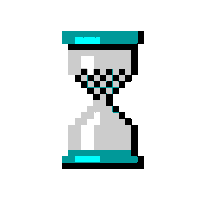
- Them: "..."
- Me:

- Them: "Hello? God Jones, it's like talking to a bloody brick wall with you sometimes."
- Me:

- Me: "How about that place wi- oh you've stormed off..."
I've had friends tell me that I'm at my best in one-to-one situations; those are when I open up the most. The more people you add to a group conversation, the quieter I can become. There's just a lot going on - a lot of conversations to keep track of, and I can't necessarily choose which ones I pay attention to. Similarly, if the environment is too "busy" or there's a lot of multi-tasking happening, I have trouble.

I'm better when I'm prepared for a conversation to happen - like, I'm expecting it to. I'm also better when I have a script, or I have an idea of how it's going to go. I struggle the most with completely ad-hoc interactions out of the blue. That's when I go "huh?" or [garbled noises] or go mute, or don't really know what's going on. Sometimes, you're like an action figure toy that has a set number of catchphrases. The Quintessentially British thing to do is just to lightly chuckle at whatever was said and hope that they made a joke, or that you're agreeing with them somehow. "Hahaha, fair. Cool."
When we can hear too much

It always baffled me as a kid how people weren't paying attention to the same sounds I was. Was it not bothering them? Like, why was I the only one to hear the cathode-ray-tube-transformer whine of the TV, which was still switched on but left on a black screen? Why was nobody else bothered by the ultrasonic buzz of fluorescent lights? How were they able to sleep when clocks were ticking downstairs? Or when standby LEDs were squealing on electronics?
This still bothers me today, but I have found that I've got more used to it. Once you find the source of the sound, or it's part of an environment that you control, it doesn't seem so bad. I have smart lights in every room in my flat. I can hear the imperceptible squeal they make communicating over wifi - it's a constant background sound. I can tell when they're sending bursts of data. I can hear the transformer whine from my computer's power supply. In my car, I can hear the faint little thunk noise my speakers make when the brake lights come on. I pay far too much attention to the refrigerant gurgle of kitchen fridges - although that's something me and a few of my friends share. When we shared a house in university, we had a fridge that sounded so goddamn satisfied with itself, with its faint little hmmmmm, and cow mooing noises. Smug bastard fridge.
I'd say that a lot of my distraction sounds are the almost imperceptible ones which other people appear to filter out because they're so quiet and just part of the environment (unless they have a tendency to be hyper-vigilant, in which case they'll pick up on them too, with varying levels of being able to ignore them after first hearing them). It's like, they're so quiet that my brain wants to direct its attention to listening really carefully to them.

I live next to a train line. You know what doesn't ever ever distract me? Multiple carriage diesel passenger trains going past my window once an hour throughout the day at 40 miles per hour. The brief, loud rumbling noise does not faze me in the slightest. But you know what will distract me? The sound of robin hopping onto a branch in the hedge that separates my garden from the railway line.
It's that kind of tiny sound that used to really bug me, which I think could make me quite snappy. Sensory overload doesn't necessarily mean loud and bright - it can mean too many subtle things. And being overwhelmed doesn't necessarily mean you scrunch your eyes shut and clap your hands over your ears or curl into a ball or nope out of that place. Sometimes it can make you irritable, prickly, or a simmering, boiling vat of unbridled rage, about to snap at whomever is unfortunate enough to cause the next diversion of attention.
As I've gotten older, I've at least learnt when I'm beginning to feel overwhelmed, and I'm able to react more reasonably, although it can still feel unreasonable when I have to explain to people - "Sorry, I have to get out of here and have a break a second. This is too much." (Must just be an excuse for me to duck out of whatever social obligation, right? It sounds like a made up thing...). But, I'm grateful for the people who do understand, or make the effort to understand.
When the Sensory Overload's Just Right 👌
It might sound a bit contradictory, but I fucking love loud noise. Blasting music in headphones? Great. Festivals, gigs, raves, standing next to the speaker stacks, sounds so loud your eyeballs vibrate - those things give me energy. Coupled with dark, crowded environments full of bright, flashing and strobing lights and lots of movement. You'd think that would be a nightmare for sensory overload - but it's like the complete opposite. It's like the music and the lights are so overpowering to the senses that any distractions from them are completely overpowered, leaving oneself free to completely get lost in the experience. I can totally go into a state of flow in those environments. It's like a warm bath or a comforting hug for the senses.

Loud music in headphones, I think a lot of people can appreciate is a great concentration aid - so I'm definitely not saying that this is a strictly neurodivergent thing; I just wanted to point out yet another curious paradox of the brain here.
Not-Tinnitus
I've also always been aware of a very faint high pitched ringing that feels internal. It's like... the subtle hiss of air, or the sound of my brain working. Maybe it's the sound of blood pumping close to my ears. It certainly hasn't come from hearing damage. It may well be the auditory counterpart to the visual snow.
The other senses
For me, vision and hearing are the senses that I predominantly notice the most issues with, namely because they're what get used the most. That's not to say that this is an exhaustive list. The other senses can be just as distracting - oh god I can feel my cuticles again. I am too aware of having skin right now. My pulse is keeping me awake. (With the latter - BP and HR unremarkable. Literally can be at 60bpm resting heart rate and 120/70 blood pressure, still gonna notice my heartbeat. Does anyone else get this when trying to fall asleep?). Then there's stuff like clothes tags, faint scents, the things my internal organs are busy doing. "I need to get comfy in order to read" translates to "Can't read this book while my intestines are busy."
Spinning Plates
Imagine you've just started learning to drive - the way you handle the car requires a lot of conscious thought, perhaps it feels quite overwhelming and you feel pretty mentally tired by the end of your lesson. You make a lot of mistakes, the car judders and movements are clumsy. There's just so much to keep track of, which experienced drivers are able to do subconsciously; their brains now treating the car as an extension of their bodies.
That's kinda how I feel with social situations, sometimes. With the cacophony of sensory things going on, on top of parallel streams of inner thoughts - it's no wonder I feel myself coming across as quite clumsy and awkward. There's so much to keep track of sometimes. It's like I have to do a lot more things consciously that other people can do automatically, all the while having to make the conscious decision to ignore sensory stimuli that normally people just filter out when higher priority things are happening. There's barely enough mental bandwidth left over to keep track of conversations, let alone take an active part in them!

Sometimes, it feels like trying to keep a whole bunch of spinning plates up in the fair. If I divert my attention to replying to something someone's said, I may very well lose track of what my hands are doing and fling red wine over their wall, or lose my balance and smother their sofa in chocolate cake, or for some reason now my thumbs are bleeding??????
It's annoying, and it's knackering, but c'est la vie. I'm starting to learn how to make things easier for myself, and it gets easier as I get older. Part of that process is just explaining all of this to other people, and learning that it's okay to ask for accommodations.
